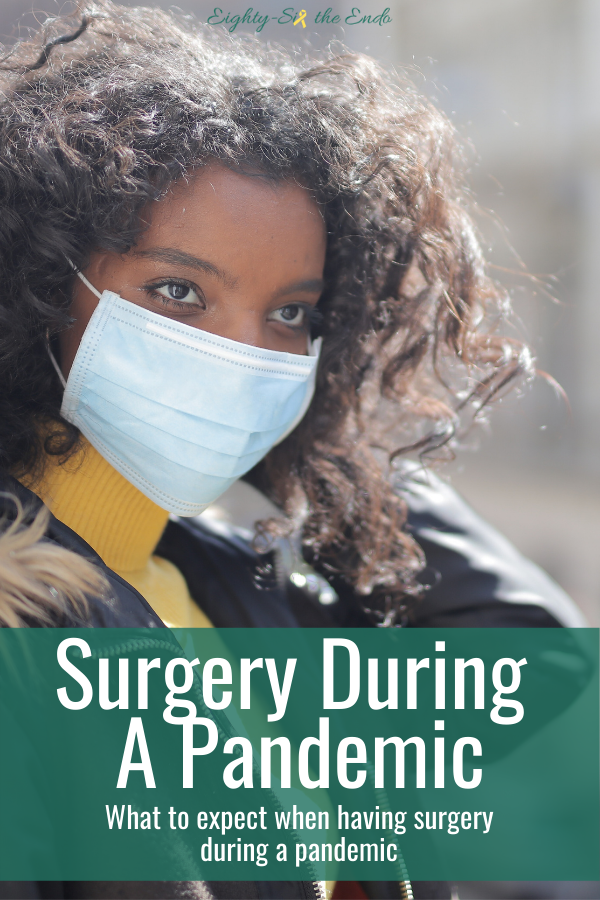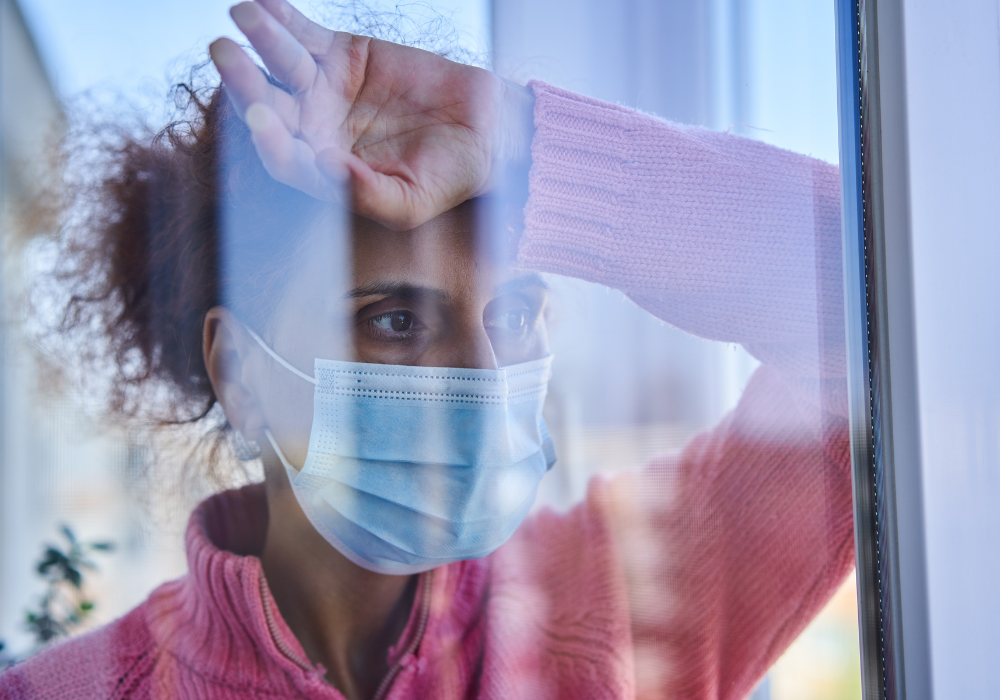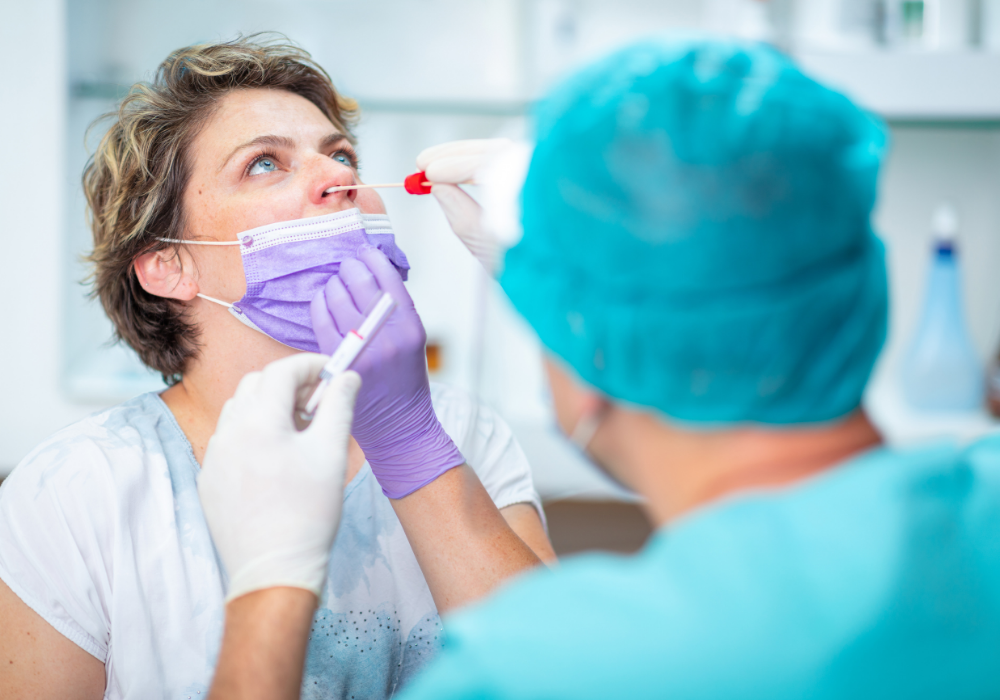
My Surgical Experience
Being that I had my surgery amid this global pandemic, I feel I can come to you from experience. But aside from that, I am a nurse who has been working through the pandemic as well (minus my 10 weeks of excision recovery).
My surgery with my excision specialist was on May 14, 2020 – a day I will never forget. It was in the COVID-19 Hot Spot of Houston, Texas and just before our second surge of cases. My surgery had originally been cancelled when our governor issued an executive order that mandated all elective procedures to be cancelled and postponed.
The fact that endometriosis surgery qualifies as an “elective” surgery is a debatable topic on its own; and I can understand both patient and healthcare perspectives.
But I digress. The cancellation of my initial surgery date proved to be beneficial to me as it gave me time to fight my insurance. Once I got my insurance to agree to pay for excision, I was ready to be rescheduled. Luckily, Houston had just seen a slight decline in hospitalizations, which allowed them to reschedule “elective” surgeries.
I must admit, I’m incredibly thankful that everything happened like it did, despite how stressful it was at the time. Otherwise, I would have fallen victim to a second cancelled surgery when we hit our second, and much worse, surge of COVID-19.
My point is, I know how anxiety ridden surgery is on its own. Now add a global pandemic and you are sure to be in a state of panic. That being said, I hope my patient and nursing experience can give you some insight.

Having Surgery During A Pandemic
Here are 7 things that you should expect if you are having surgery during a pandemic, like COVID-19.
1. Sudden Cancellations/Rescheduling
As many have already experienced this year, the pandemic has led to sudden cancellations in surgeries. Just in my observation, this mostly has happened after surges in numbers. But really, it can happen for many reasons:
- Increase in COVID-19 related hospitalizations
- Surgical team shows symptoms of the virus and has to quarantine until they are tested and cleared.
- Decrease in available Operating Rooms due to decreases in staff.
- Positive pre-procedure COVID-19 Screening
2. Delays in responses/call backs
As hospital systems and clinics try to manage the financial and physical burdens of COVID-19, many are forced to decrease staffing to stay afloat. On top of that, some clinics are rotating staff through the clinic, while the remainder work from home. Combine that with increased calls to clinics from concerned patients, plus possible drops in internet service for those trying to work-from-home, and you are left with pure chaos.
So, remember, your healthcare providers are doing everything in their power to provide safe, compassionate, and effective care. They are constantly having to reprioritize their calls and many tasks. Be patient with non-urgent matters. But if you are experiencing an emergency or have very concerning symptoms, don’t wait for a call back. Just go to your closest urgent care or ER. If you just had surgery, then they should’ve discharged you with a list of signs and symptoms that require immediate attention.

3. The Dreaded Test
Out of very necessary precautions, it should come as no surprise that you will require a pre-procedure COVID-19 screening. The virus can be spread by droplets and aerosols, and an invasive surgery checks both boxes.
Hospital and surgical staff are at increased risk of contracting the virus in the operating room. This also puts risk on the many other patients they perform procedures on. Basically, they must take every precaution and that means you must get the COVID-19 screening test done; even though we know that the test does not guarantee 100% safety.
Some hospitals have you take it the day before surgery. Others have you take it 2-3 days before. Regardless of when it’s done, they should have you quarantine after your test is done and until the day of surgery.
You may be wondering what it will be like to get a COVID-19 screening test done. The test consists of a deep nasal swab where they use a long Q-tip, stick it up your nostril, and rotate it around for about 5-10 seconds. Honestly, no one can really prepare you for it. Let’s just say, I felt like my brain was being scraped out. My best advice is to stay calm, make sure your head is up against a headrest or wall, and try to breathe through it.
4. Traveling from a COVID Hot Spot
If you are traveling out of state for surgery, you will need to keep a couple of additional things in mind.
Some states require you to quarantine for 14 days if you are traveling from a COVID Hot Spot or states with multiple Hot Spots. However, in Texas, this rule did not apply to those traveling for medical care. Patients were advised to obtain proof of medical appointments from their physician to travel.
So, be sure to check the destination’s state rules if you are traveling out of state. You may be able to use a printed appointment schedule from a patient portal or ask your surgeon’s office for a letter to have while traveling.
NOTE: For more information on traveling for surgery, the Center for Endometriosis Care has great information that is particular to their center. But I think that some of the information could be applied to any travel situation or will give you things to think about.
5. Mask Up!
Well, if you don’t know this by now, I’m not sure what to say . . . but expect to have to wear a mask from the moment you enter the surgeon’s office or hospital to the moment you leave.
Aside from that, you may notice some of your nurses and medical staff also wearing a face shield in addition to their face mask. Though this is not mandated in all hospitals, the CDC does recommend face shields or eyewear for healthcare providers providing close contact care. This is to prevent droplets from getting into the eyes.
At the end of the day, if staff is only required to wear a mask, you may notice some staff wearing face shields and some not. It’s essentially up to the individual staff member.
6. Immunocompromised
Generally, having endometriosis does not place you at increased risk of getting COVID-19. Of course, there is a large population of the community that have multiple diagnoses, some that may place you at increased risk of contracting the virus. Likewise, certain medications for other diagnoses may cause a suppressed immune system. If you have questions as to whether you fall in this category, talk to your doctor.
Despite all of this, immediately following surgery, you will be at increased risk and slightly immunocompromised. So be diligent and take precautions during your immediate recovery and for about 4-6 weeks after surgery.

7. Visitation Policies
Finally, I want to touch on the concern that most patients have. Can you bring someone with you? Well, it depends. This pandemic has caused daily changes to hospital visitation policies, so it will be dependent on the hospital that you are having surgery at.
Some hospitals are allowing just one person to accompany you, which I think is the best situation for both patient and hospital. Not only does this provide you with the support you need, but it also provides an added level of safety for you in the healthcare setting. A visitor can be an additional advocate to you and be there to ask questions when you are still in-and-out of sedation. But, unfortunately, my opinion does not affect hospital policy.
I will tell you this though, there are exceptions to these policies. In my experience, a patient is usually allowed an “essential visitor” in certain situations where COVID is not suspected. Usually, these exceptions are made for patients who are confused, require mobility assistance, and are in emergent situations where they cannot make decisions for themselves.
This is why most hospitals in my area are allowing 1 essential visitor for surgical patients. But if you are faced with no options, you need to know that there are still circumstances where you can fight for an essential visitor.
If you suffer from PTSD from past medical trauma or have severe anxiety, then I encourage you to reach out to a Patient Liaison at the hospital you are having surgery at. Some hospitals may call them Patient Advocates or Patient Navigators, but their role is to help fight for you and your medical care. They may be just the person to help you fight to have your parent, significant other, or friend there with you. I truly hope you get approval, if you are in this situation.
Last notes about having surgery during a pandemic
Although this post was a little late to the game, COVID-19 is still very real and rampant in certain areas of the world. And now that we’ve entered the holiday season, we are expecting surges in numbers. So be safe. Be diligent in wearing your mask, washing your hands, and practicing social distancing.

